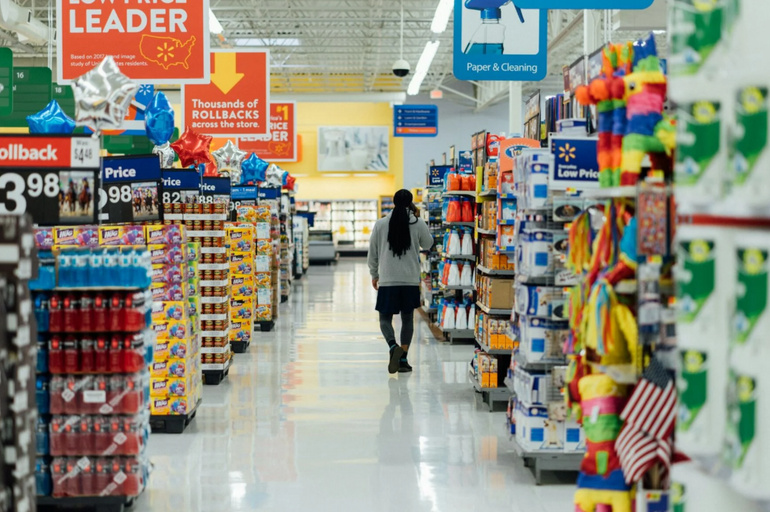Massachusetts grocery stores could be banned from adjusting prices or sending targeted advertisements based on customers’ biometric data under proposals gaining momentum in the Legislature.
A Rep. Lindsay Sabadosa bill (H 99) that looks to proactively block supermarkets from deploying surveillance pricing and surveillance advertising secured initial approval from the House on Monday.
The first-time filing aims to prevent grocery stores from jacking up their prices while more than 1 million Bay Staters are already grappling with food insecurity, according to the Northampton Democrat. It also installs guardrails on collecting and using insights gleaned from customers’ biometric data, such as their fingerprint, voiceprint, eye retinas, gait or “other unique biological patterns,” according to the bill.
“While this technology has not yet spread widely in Massachusetts, it’s an imminent threat, with large chains like Kroger and Walmart already rolling it out across the country,” Sabadosa wrote in a Facebook post on April 9, after she testified on the bill before the Advanced Information Technology, the Internet and Cybersecurity Committee. “With one in three families facing food insecurity in the Commonwealth, we must act now to prevent corporate surveillance from becoming a standard practice in our grocery stores.”
Senate members of the committee sent a redrafted companion bill (S 2515) from co-chair Sen. Michael Moore to the Senate Ways and Means Committee on May 12.
Grocery chain Kroger and Microsoft in early 2019 announced a technology collaboration to “enable higher levels of personalization.” They tested digital shelving systems, with electronic tags containing information about a product’s price, promotions and nutrition facts. Rodney McMullen, then-CEO of Kroger, had said the new technology would help “reinvent the customer experience and create new profit streams that will also accelerate our core business growth.”
In a letter to McMullen last August, U.S. Sens. Elizabeth Warren and Bob Casey sounded the alarm about Kroger’s use of digital tags to “surge grocery prices and exploit consumers.” They warned the widespread use of the technology could “introduce the potential for grocery giants to abuse their power and surge grocery prices, raising prices suddenly and at times when certain products are in highest demand.”
Walmart and Kroger have said they will not use digital price tags to engage in “dynamic pricing,” though they will use the technology to offer discounts, according to Fast Company. Kroger has also denied plans to use facial recognition software, after the company faced scrutiny from U.S. Rep. Rashida Tlaib, The New York Times reported.
Under the pending bills, customers could seek relief in court if their biometric data is used to suggest products or adjust prices. Shoppers could recover “actual damages or $5,000, whichever is higher,” according to a bill summary.
Massachusetts-based food pantries and “food justice” groups support the legislation, alongside Consumer Reports and the Electronic Privacy Information Center, a nonprofit research organization based in Washington, D.C.
Woodrow Hartzog, a professor at Boston University’s School of Law, said surveillance pricing allows companies to figure out the highest price that customers are willing to pay.
“This disastrous practice leads to price gouging, discrimination by proxy, an inability to budget, data hoarding, and the suffocating feeling that every choice you make while shopping is a trap,” Hartzog testified to the AITIC Committee. “This bill would prohibit food stores from using tools like facial recognition to charge people different prices and provide vital breathing room for customers, while still allowing for people to receive discounts.”
The bill also cracks down on surveillance advertising, which Sabadosa called “predatory.”
“The grocery store can conceivably provide ads to you as you shop, based on what you most desire and what you have previously purchased,” Sabadosa told the committee. “So this means even the most disciplined shopper could be enticed to buy things that they weren’t really intending upon buying.”
Edgar Dworsky, a former assistant attorney general in consumer protection who wrote the food store item pricing law in 1987, questioned lawmakers’ concerns over surveillance pricing.
He suggested that supermarkets would likely use expanded personal data to offer targeted discounts to shoppers — rather than hitting them with steeper prices. That would echo how supermarkets have used data gathered from loyalty programs to offer personalized discounts, Dworsky said in written testimony.
“Your bill, however, would prevent stores from using any biometric data collected to offer lower prices to identified shoppers,” wrote Dworsky, who’s also founder of Consumer World. “That strikes me as anti-consumer. If you are not banning the collection of biometric data to start with, why not simply prevent its use for the purpose of imposing higher than the standard or established price?”
Referencing electronic shelf labels, Dworsky added, “I do not agree with the alarmist position of other well-meaning consumer advocates who suggest only the potential detrimental use of this type of data along with ESLs, when historically, data based on personal purchase habits have been used to benefit shoppers by offering them lower prices.”
The ACLU of Massachusetts said it supports the legislation but wants the protections to be expanded to “all goods, not just food.”
“Prohibit surveillance-pricing generally, not just pricing driven by biometric surveillance,” the advocacy organization also suggested in written testimony. “Charging different customers different prices for the same product based on a personal profile is problematic whether that profile is derived from a person’s biometrics or other personal data.”

